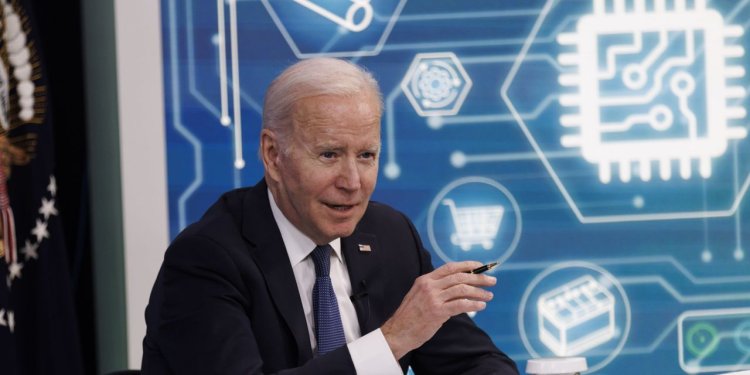Big Brother and the Digital Dollar
Ingemar Ståhl’s 1979 essay foresaw the threat of social credit and ‘debanking.’ By Daniel B. Klein Aug. 22, 2023 6:31 pm ET Joe Biden speaks while meeting with business leaders and governors in the Eisenhower Executive Office Building in Washington, March 9, 2022. Photo: Ting Shen/Bloomberg News President Biden signed an executive order last year urging government agencies to research a potential central bank digital currency. CBDCs are a despotic innovation, of the sort that have besieged us during the past five years—lockdowns, mask and vaccination mandates, “antiracism” policies, “green new deals,” projects to suppress “misinformation” and so on. Opponents of tyranny have long understood how governments abuse the money supply to finance their spending. But the role that transaction-based information would play in tyranny doesn


Joe Biden speaks while meeting with business leaders and governors in the Eisenhower Executive Office Building in Washington, March 9, 2022.
Photo: Ting Shen/Bloomberg News
President Biden signed an executive order last year urging government agencies to research a potential central bank digital currency. CBDCs are a despotic innovation, of the sort that have besieged us during the past five years—lockdowns, mask and vaccination mandates, “antiracism” policies, “green new deals,” projects to suppress “misinformation” and so on.
Opponents of tyranny have long understood how governments abuse the money supply to finance their spending. But the role that transaction-based information would play in tyranny doesn’t show up in the dystopian fiction of Aldous Huxley and George Orwell or the earnest warnings of Alexis de Tocqueville, Hilaire Belloc and Friedrich Hayek.
Only more recently has it become clear how payment systems could afford a system of surveillance and “debanking” customers based on political and religious beliefs. The Chinese Communist Party has put this on display, using a social-credit system to stamp out dissent and secure its one-party rule. Bullies in Canada, the U.K. and elsewhere prove themselves quick pupils.
In their putrescent 2020 book, “COVID-19: The Great Reset,” Klaus Schwab and Thierry Malleret write: “This transition towards more digital ‘of everything’ in our professional and personal lives will also be supported and accelerated by regulators.” They add: “In banking, it is about being prepared for the digital transformation.”
In 1979, Ingemar Ståhl warned about this in a satirical essay, “It Will Soon Be 1984 . . .” Ståhl, an economist and professor at Sweden’s Lund University, was active in public debate on such issues as industrial policies, rent control, defense, taxation and healthcare. Originally on the left, Ståhl’s thinking migrated toward a market approach.
“It Will Soon Be 1984 . . .” was first published in a Swedish daily, Svenska Dagbladet. The newspaper provided photos and ironic captions, one saying: “The point of the cashier’s [scanning] pen will be the eye of the State on your consumption.” The essay satirically proposed tracking every transaction in the Swedish economy, including the identities of the buyer and the seller. Cash would be taken out of circulation.
Part of the ironic rationale was to ensure, as Ståhl put it, that “tax inspectors will have the opportunity to both explain and to persuade less solidaristic citizens—undoubtedly a diminishing group—of the necessity of surrendering most of their income to a society.” Too many have been “influenced by the tax-evasion propaganda from the right-wing bourgeoisie.” Thus, the proposal addresses “a sizeable problem of social justice, equity and possibly even of gender equality.”
Authorities will be able to discourage “inappropriate ‘consumption profiles’ from a social standpoint,” Ståhl writes: “In many cases, a conversation between the household and the National Board for Consumer Policies or the local municipal consumer board should be sufficient. In more deviant and problematical cases, society may have to intervene with more-intensive consumer-care measures.”
Supporters of last year’s Canadian trucker protests and British politician Nigel Farage
can testify about their experience with “more-intensive consumer-care measures.” The price of their dissent was to have their bank accounts canceled.Ståhl projects mock pride in Swedish sophistication: “What the Khmer Rouge was unable to achieve because of their technological backwardness will be fulfilled by the technical ingenuity and cultural prowess of the Swedish people over the coming five-year period. We have already taken the decisive step by adopting modern computer techniques and personal identification numbers.”
Ståhl was alluding to Cambodia’s communist dictator, Pol Pot, who took power in 1975 and attempted to abolish money.
Methods and means evolve, while human nature and tendencies toward despotism remain the same. CBDC is a solution in search of a problem, like many other despotic innovations of late.
Mr. Klein is a professor of economics at George Mason University’s Mercatus Center, a research fellow of the Stockholm-based Ratio Institute and chief editor of Econ Journal Watch.
What's Your Reaction?

















